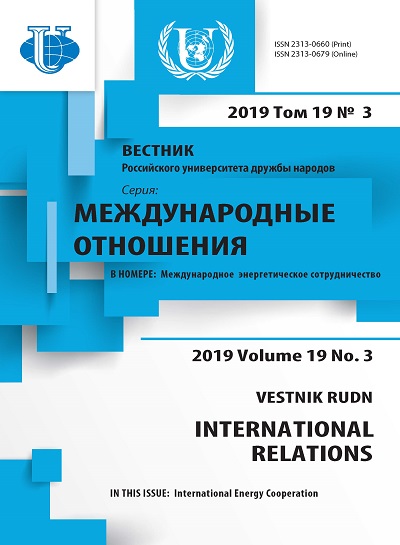Saudi Arabia’s G20 Presidency in 2020
- Authors: Basangov L.L.1, Ignatov A.A.2
-
Affiliations:
- Moscow State Institute of International Relations
- Russian Presidential Academy of National Economy and Public Administration
- Issue: Vol 19, No 4 (2019): Islamic Factor in World Politics
- Pages: 654-662
- Section: INTERNATIONAL ECONOMIC RELATIONS
- URL: https://journals.rudn.ru/international-relations/article/view/22844
- DOI: https://doi.org/10.22363/2313-0660-2019-19-4-654-662
Cite item
Full Text
Abstract
The G20 is an informal institute of global governance and one of the most prominent international forums for both - key developed and developing economies. The G20’s agenda embraces various issues including international taxation, digital growth, macroeconomic stability, labor market development, fight against crime and corruption, implementation of effective and eco-neutral energy technologies, etc. The G20’s decisions, even lacking legal force, tend to transform into international standards and joint initiatives. Due to the absence of a permanent secretariat, a host country exercises great influence on formulation of the G20’s working agenda. The Kingdom of Saudi Arabia is a key actor in the Middle East and the only Arab state with G20 membership. In 2020, Saudi Arabia will take the G20 presidency for the first time ever and thus take the leading role in shaping its agenda. In this context, several issues regarding Saudi Arabia’s policy towards implementation of its national development agenda, promotion of previous presidencies’ decisions and its influence over further development of the G20’s agenda are of particular interest. The authors analyze Saudi Arabia’s current status and national priorities and recent developments of G20’s agenda to forecast the results of the forthcoming presidency. The authors point out that discussion on digital growth, energy efficiency, climate change mitigation and macroeconomic policy would very likely result in concrete decisions. Modest success is expected in making decisions on gender-related agenda. The core items of G20’s agenda such as reform of international financial institutions and fight against protectionism in global trade are less likely to attract much attention and lead to concrete decisions.
Keywords
About the authors
Lari Lidzhievich Basangov
Moscow State Institute of International Relations
Author for correspondence.
Email: laribasangov@gmail.com
Master Student
Moscow, Russian FederationAlexander Alexandrovich Ignatov
Russian Presidential Academy of National Economy and Public Administration
Email: ignatov-aa@ranepa.ru
Junior Researcher, Center for International Institutions Research (CIIR)
Moscow, Russian FederationReferences
- Akbarzadeh, S. & Ahmed, Z.S. (2017). Impacts of Saudi Hegemony on the Organization of Islamic Cooperation (OIC). International Journal of Politics, Culture and Society, 31 (3), 297—311.
- Buys, E. & Garwood-Gowers, A. (2019). The (Ir)Relevance of Human Suffering: Humanitarian Intervention and Saudi Arabia’s Operation Decisive Storm in Yemen. Journal of Conflict & Security Law, 24 (1), 1—33. doi: 10.1093/jcsl/kry019
- Dudarev, K.P. (2017). Winds of Change over Saudi Arabia. Asia and Africa Today, 11 (724), 39—44. (In Russian).
- Ehteshami, A. (2018). Saudi Arabia as a Resurgent Regional Power. The International Spectator, 53, 73—94. doi: 10.1080/03932729.2018.1507722
- Ganiev, T.A. & Karyakin, V.V. (2018). The Great Middle East: Geopolitical Regional Studies of Conflictogenic Center of World Civilization. Arkhont, 4 (7), 15—28. (In Russian).
- Kharas, H. & Lombardi, D. (2012). The Group of Twenty: Origins, Prospects and Challenges for Global Governance. Brookings Institutions. URL: https://www.brookings.edu/wp-content/uploads/2016/06/g20-global-governance-kharaslombardi.pdf (accessed: 12.08.2019)
- Kirton, J. et al. (2016). Compliance Coding Manual for International Institutional Commitments. G7 and G20 Research Groups. May 2. URL: https://www.ranepa.ru/images/media/brics/analytics/compliance-coding-manual-2016%20(1).pdf (accessed: 12.08. 2019).
- Kosach, G.G. (2016). “Vision 2030”. Saudi Reforms. Russia and the Muslim World, 6 (300), 107—123. (In Russian).
- Kosach, G.G. (2018). Saudi Arabia Today. Svobodnaya mysl’, 2 (1668), 83—96. (In Russian).
- Larionova, M.V. (2017). Germany G20 Presidency. The Test by Trump. Vestnik RUDN. International Relations, 17 (4), 807—823. doi: 10.22363/2313-0660-2017-17-4-807-823 (In Russian).
- Larionova, M.V. & Kolmar, O.I. (2017). The Hangzhou Consensus: Legacy for China, G20 and the World. International Organisations Research Journal (IORJ), 12 (3), 53—72. doi: 10.17323/1996-7845-2017-03-53 (In Russian).
- Larionova, M.V. (2012). Supply-Demand Model for Developing a Presidency Proposals for Reform Agenda and Priorities in Informal International Institutions (G20, G8, BRICS). International Organisations Research Journal (IORJ), 4 (39), 7—17. (In Russian).
- Larionova, M.V. (2019). Results of the G20 Summit: Mitigation of Risks. Russian Economic Developments, 26 (7), 7—12. (In Russian).
- Larionova, M.V., Ignatov, A.A., Shelepov, A.V., Sakharov, A.G. & Popova, I.M. (2019). G20 at Ten: Conclusive Accomplishments, Persistent Challenges, New Risks, Future Priorities. Moscow: Delo Publishing House. (In Russian).
- Naumenko, T.V. & Timahov, K.V. (2019). Saudi Arabia’s Economic Competitiveness in the Middle East. MGIMO Review of International Relations, 1 (64), 147—167. doi: 10.24833/2071-8160-2019-1-64-147-167 (In Russian).
- Rudenko, L.N. (2018). Economic Problems of Saudi Arabia. Russian Foreign Economic Journal, 3, 114—128. (In Russian).
- Safonkina, E.A. (2018). Argentina’s 2018 G-20 Presidency. The Agenda and Objectives. Latinskaia Amerika, 3, 20—36. (In Russian).
- Tsvetkov, Yu.A. (2018). International Legal Assessment of Saudi Intervention in Yemen. Vestnik Akademii Sledstvennogo komiteta Rossijskoj Federacii, 3 (17), 48—56. (In Russian).











